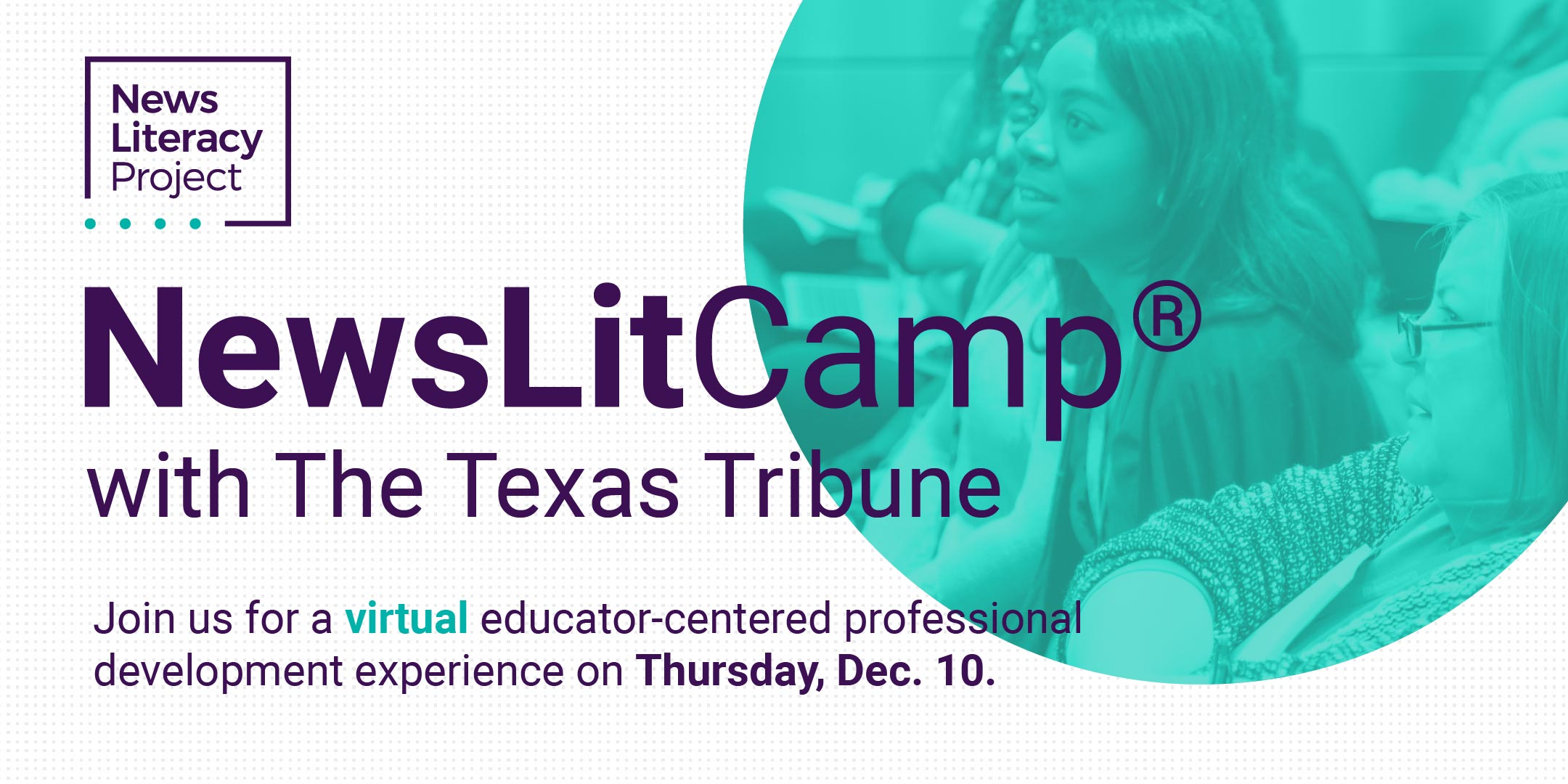National NewsLitCamp® with Report for America
Join us on Oct. 27 for a National NewsLitCamp with Report for America, a virtual, immersive day of professional learning built exclusively for educators.
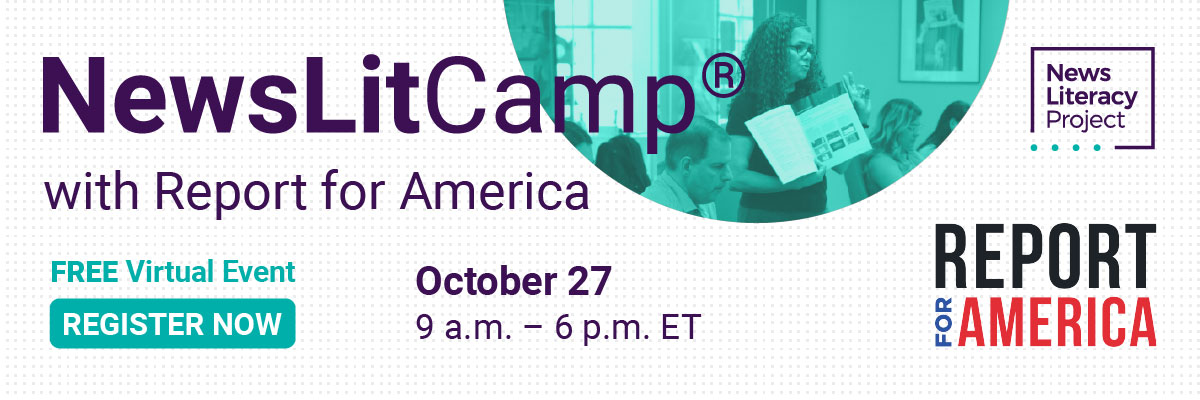
Friday, October. 27, 2023
9 A.M. – 6 P.M. EST
Ready to integrate news literacy topics into your classroom? Want to connect directly with journalists and learn more about how to help students navigate our increasingly complex information landscape?
Join us for this virtual, immersive day of professional learning built exclusively for educators, presented by the News Literacy Project in partnership with Report for America.
Registration is now open.
This NewsLitCamp® with Report for America is a free series of sessions led by journalists from Report for America as well as news literacy experts. It is designed to help educators address topics around news and media literacy in the classroom with confidence.
Topics will include:
- What it means to be “news literate.”
- Reporting on your own community: exploring ethics and objectivity in community journalism.
- Bringing journalists to the classroom with Report for America.
- Understanding news media bias.
In addition, a feature session at 1 p.m. ET will showcase our brand-new, on-demand NewsLitNation Professional Learning platform, which contains in-depth news and media literacy courses for educators. Join us to hear about this exciting benefit available exclusively for our NewsLitNation members and learn more about the accompanying News Literacy Educator Certificate!
The first session starts at 9 a.m. ET with additional sessions continuing throughout the day until 6 p.m ET. All session descriptions will be available on our Eventbrite online event page.
The event is open to all educators. No matter where you are or what grade level or subject area you teach, if you’re an educator interested in news literacy, we’d love to see you there. There is no cost to attend.
Can’t make the whole day but really interested in a few sessions? That’s OK — you are still welcome to attend the sessions that fit your schedule. Reserve your spot today!
All sessions will be recorded and made available to everyone who registers.
Questions? Email us at [email protected].
National NewsLitCamp®️: Trust and Credibility | Recordings
NewsLitCamp®: Trust and Credibility was held on Jan. 27, 2023 as part of National News Literacy Week.

NewsLitCamp: Trust and Credibility was a free, virtual event hosted by the News Literacy Project in partnership with NBCUniversal News Group! It was designed to help educators teach students to analyze news and information with a skeptical — not cynical — eye. The professional learning highlighted:
- What it means for news to inform us credibly.
- How persuasion can and should be credible.
- What it means for a source to be trustworthy.
Sessions started at 9 a.m. ET Jan. 27 and continued throughout the day. They included insights from journalism professionals and news literacy and media experts nationwide, along with the opportunity to connect and share directly with others.
View speakers and panelists here.
Sessions and recordings
Welcome to NewsLitCamp and opening session: What does it mean to be “news-literate”?
In this webinar, we provided an overview of the news literacy concepts and skills that students need in order to be reliably informed, such as recognizing the difference between news and other types of information, including opinion and propaganda. We used the standards of quality journalism to identify credible news sources and common types of misinformation.
Introduction to resources from the News Literacy Project
Join experts from The News Literacy Project for a session highlighting NLP-developed resources to introduce and incorporate key news literacy concepts in your classroom. This session was facilitated by Shaelynn Farnsworth, Senior Director of Education Partnership Strategy.
How can journalists call out misinformation without being perceived as biased and losing the public trust?
Join us for a panel of NBCUniversal News Group journalists, moderated by Ali Velshi, MSNBC host, as they discussed how journalists today approach balancing credibility and persuasion, debunking misinformation and maintaining public trust. Featured panelists included Tom Llamas, NBC News NOW anchor; Brandy Zadrozny, NBC News senior reporter; and Chris Scholl, NBC News Standards senior vice president. The discussion was followed by a live audience Q&A.
How news organizations ensure fair representation on air
How does a news organization determine who should appear on a panel discussing hot button issues to ensure a fair representation of views? Join us for a panel discussion focused on how newsrooms ensure credible, fair representation of topics on air and how they can combat misinformation. Moderated by Jesse Rodriguez, MSNBC vice president of Editorial and Booking, this panel included Bill Hinkle, coordinating producer of NBC News NOW; Lori Ann LaRocco, CNBC News senior editor of guests; Andre Brooks, NBC News NOW executive producer; and Nina Sen, director of NBC News Standards. It was followed by a live audience Q&A.
How can the news media repair its trust problem with marginalized communities?
What factors have led to a deterioration of trust when it comes to the media and communities they cover? Moderated by NBC News NOW Correspondent Zinhle Essamuah, this afternoon panel addressed timely questions about the relationship between traditional news media and marginalized communities, what journalists are doing to address the disconnect and more. Featured panelists included Guad Venegas, NBC News correspondent; Jamie Nguyen, NBC News Consumer Investigations senior producer; Chiara Sottile, NBC News reporter and producer; and Belén Smole, Philadelphia’s Telemundo 62 anchor. The discussion was followed by a live audience Q&A.
Harm & Distrust: Why communities of color often have misgivings about mainstream news
Marginalized communities have not always received fair coverage from legacy news organizations. In fact, throughout American history, many groups have suffered demonstrable harms from biased, one-sided or otherwise problematic coverage. While significant progress has been made, newsrooms still lack diversity, sometimes fail to scrutinize official narratives and struggle to equally serve the information needs of all members of the public.
The News Literacy Project released a Checkology® virtual classroom lesson titled “Harm & Distrust” that examines the damage caused by mainstream coverage of Black Americans, and the legacies of distrust this has produced. To launch this new lesson, we hosted a virtual conversation to explore these issues and look at how today’s journalists have made strides but still have a way to go. Joining us are Pulitzer Prize-winning journalist Wes Lowery; lesson host and WBEZ reporter Natalie Moore; Peter Adams, NLP’s senior vice president of research and design; and moderator Julia Torres, director of special projects at EduColor.
National NewsLitCamp® hosted by NBCUniversal: Trust and Credibility
Join us on Jan. 27 for NewsLitCamp®: Trust and Credibility, held as part of National News Literacy Week.



Friday, Jan. 27, 2023
9 A.M. – 6 P.M. EST
Registration is now open.
Join us for this immersive conference built exclusively for educators, presented by the News Literacy Project in partnership with the NBCUniversal News Group!
According to the Pew Research Center, teens and adults under 30 are now almost as likely to trust information from social media as they are to trust information from national news outlets. In a complex digital landscape where anyone can be an “expert,” the ability to identify signs of credibility is a vital skill. As partisan divides in media trust widen, knowing how to parse through this information is critical to a functioning democracy. How do we decide who to trust and what to believe?
This special NewsLitCamp is a unique, virtual event designed to help educators teach students to evaluate news and information with a skeptical — not cynical — eye.
Sessions will feature top journalists from NBC and elsewhere, including Ali Velshi, Brandy Zadrozny, Tom Llamas, Guad Venegas and Belén Smole.
Topics will cover:
- What it means to be “news literate.”
- Avoiding perceptions of bias when reporting on misinformation.
- How news organizations ensure fair on-air representation.
- How the news media can repair its trust problem in marginalized communities.
In addition, a feature session at 3 p.m. ET includes the debut of “Harm & Distrust,” the latest lesson in NLP’s Checkology®️ e-learning platform. Journalists Wes Lowery and Natalie Moore, as well as NLP’s Peter Adams and EduColor’s Julia Torres, will discuss why communities of color have misgivings about mainstream news, and the progress and setbacks of today’s journalists and their coverage.
The first session starts at 9 a.m. ET with additional sessions continuing throughout the day. All sessions will be recorded and made available to everyone who registers.
What is NewsLitCamp?
NewsLitCamp is an immersive, free professional learning experience primarily for middle and high school educators. It features topical sessions led by journalists and news literacy experts, designed to develop expertise in news literacy education, share specialized teaching resources and provide a behind-the-scenes view of the news reporting process.
What can I expect?
Educators who join NewsLitCamp: Trust and Credibility will leave the day with new ideas, skills and resources to help students navigate today’s complex and challenging information landscape. They will be equipped to demystify what it means to evaluate news and information for trustworthiness and credibility.
Whether you’re a teacher, a librarian or an education professional looking to build upon your news literacy skills, we’d love for you to join. Register now.
Questions? Email us at [email protected].
NewsLitCamp Philadelphia


Calling all educators in the Philadelphia area and those attending the National Council for the Social Studies (NCSS) conference! Please join us on Friday, Dec. 2 from 8 a.m. to 3 p.m. ET for NewsLitCamp® Philadelphia, a day of immersive, in-person professional learning built exclusively for educators and focusing on key news literacy concepts. The event will be held at WHYY’s Philadelphia newsroom.
During this NewsLitCamp, co-hosted by WHYY and The Philadelphia Inquirer, you can expect to learn directly from journalists who will share their insider expertise on how they do their work and the behind-the-scenes workings of a modern newsroom.
As you may know, NewsLitCamp is a unique opportunity for teachers, librarians and other educators across all subjects to connect directly with journalists and hone their ability to teach students how to sort fact from fiction.
Listen to what educators and journalists who have participated in NewsLitCamp have to say in this engaging and brief video.
All Philadelphia-area educators, including librarians and library media specialists, as well as educators in town for the NCSS conference, are encouraged to register for this special event.
We hope you can join us for this full day of news literacy programming!
This event is generously sponsored by the Knight Foundation.
Questions? Please reach out at [email protected].
Detroit educators: Don’t miss this upcoming NewsLitCamp®
End your school year on a high note by attending the News Literacy Project’s premier free professional learning event, NewsLitCamp.
Detroit NewsLitCamp, Part 2, June 23, 4:30 to 7:30 p.m. ET
Please join us for a virtual half-day of professional learning focusing on key news literacy concepts built exclusively for educators within the Detroit Public Schools Community District and surrounding areas.
During this NewsLitCamp, you can expect to hear firsthand from journalists with the Detroit Free Press and the Michigan Advance. This is the second installment of our NewsLitCamp Detroit series for the 2021-22 school year. This event is sponsored by the Knight Foundation.
Virtual NewsLitCamp: NewsLitCamp Detroit (part 2)


Calling all Detroit Public Schools educators! Please join us on Thursday, June 23 from 4:30 p.m. to 7:30 p.m. ET for NewsLitCamp® Detroit part 2, a virtual half-day of professional learning focusing on key news literacy concepts built exclusively for educators within the Detroit Public Schools Community District and surrounding areas.
This is the second installment of our NewsLitCamp Detroit event series for the 2021-2022 school year.
Registration is limited to Detroit Public School educators only. To register, click here.
Issues accessing this registration page? Email us at [email protected].
To view the event schedule, click here.
During this NewsLitCamp, you can expect to hear firsthand from journalists from the Detroit Free Press and the Michigan Advance, who will share their insider expertise on the behind-the-scenes workings of a modern newsroom.
As you may know, NewsLitCamp is a unique opportunity for teachers, librarians, and other educators across all subjects to connect directly with journalists and hone their ability to teach students how to sort fact from fiction.
Listen to what educators and journalists who have participated in NewsLitCamp have to say in this engaging and brief video.
All Detroit Public School educators, including librarians and library media specialists, are encouraged to register for this special event, regardless of subject area or grade level.
We hope you can join us for this interactive half-day of news literacy programming!
This event is generously sponsored by the Knight Foundation.
Questions? Please reach out at [email protected].
In-Person NewsLitCamp: Berks County
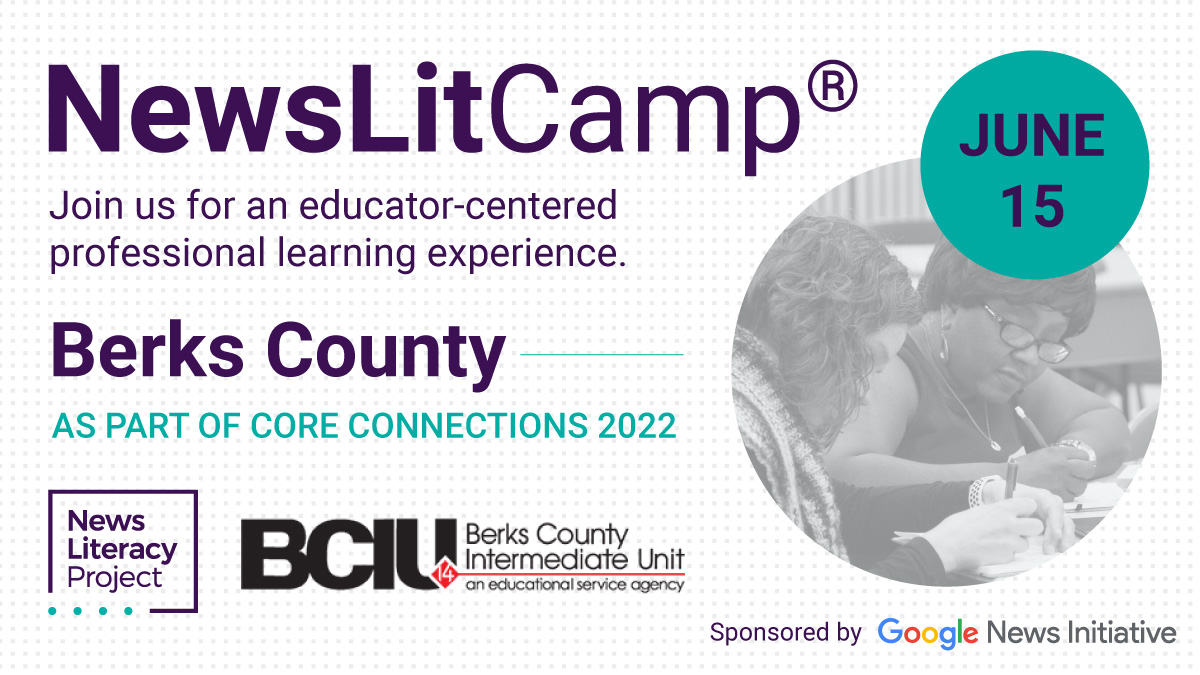

Calling all educators in Berks County, Pennsylvania!
We’re excited to announce NewsLitCamp® Berks County, hosted in partnership with the Berks County Intermediate Unit’s Core Connections Conference 2022!
Join us on June 15 from 9 a.m. to 3 p.m. ET for an immersive (and FREE!) professional development experience focusing on essential news literacy concepts.
This event is generously sponsored by the Google News Initiative.
Register today
NewsLitCamp is an immersive, free professional learning experience primarily for middle and high school educators. It features topical sessions (selected with input from participants) led by journalists and news literacy experts, designed to develop expertise in news literacy education, share specialized teaching resources and provide a behind-the-scenes view of the news reporting process.
You’ll leave NewsLitCamp with new ideas, skills and resources to help your students navigate today’s complex and challenging information landscape and demystify what distinguishes quality journalism from rumors, hoaxes and other types of misinformation.
If you are a middle or high school teacher, librarian, or other educator, or you know one who might be interested, please register and tell your colleagues about NewsLitCamp.
Educators who attend Core Connections conference are eligible to earn up to 10 Act 48 credits.
See you on June 15!
Hybrid NewsLitCamp: Pittsburgh


Southwestern Pennsylvania educators – we can’t wait to host you for NewsLitCamp® Pittsburgh!
The News Literacy Project is pleased to announce our very first hybrid-style NewsLitCamp on Monday, June 6 at 8 a.m. ET, in partnership with the Pittsburgh Post-Gazette, and sponsored by The Grable Foundation.
Register today
If you are local to Pittsburgh, join us in-person at the Pittsburgh Post-Gazette headquarters for an engaging (and FREE!) day of professional learning. Here, you’ll learn from Post-Gazette journalists, alongside experts from The News Literacy Project, about critical news literacy concepts you can take back to the classroom.
If you are unable to join in-person, no problem! Our virtual attendance option makes it easy to participate with other educators in real-time, via Zoom.
The day’s programming will culminate with a very special NewsLit Nation happy hour event, hosted at Southern Tier Brewery in the heart of Pittsburgh.
If you are a middle or high school teacher, librarian, or other educator, or you know one who might be interested, please register and tell your colleagues about NewsLitCamp.
Educators are eligible to receive Act 48 credits by attending this event. Register today!
Virtual NewsLitCamp: Great Lakes


Please join us on Wednesday, May 25, from 9 a.m. to 3 p.m. ET for NewsLitCamp® Great Lakes, in partnership with the Star Tribune and the Akron Beacon Journal, and sponsored by the Knight Foundation.
Register here: https://newslitcampgreatlakes.sched.com/
This is a unique, virtual (and FREE!) experience for educators across the Great Lakes region. Educators in Minnesota, Michigan, Ohio, Indiana, Wisconsin, Illinois, and Iowa are encouraged to attend.
NewsLitCamp is an immersive, free professional learning experience primarily for middle and high school educators. It features topical sessions (selected with input from participants) led by journalists and news literacy experts, designed to develop expertise in news literacy education, share specialized teaching resources and provide a behind-the-scenes view of the news reporting process.
You’ll leave NewsLitCamp with new ideas, skills and resources to help your students navigate today’s complex and challenging information landscape and demystify what distinguishes quality journalism from rumors, hoaxes and other types of misinformation.
If you are a middle or high school teacher, librarian, or other educator, or you know one who might be interested, please register and tell your colleagues about NewsLitCamp.
NewsLitCamp Miami
Calling all Miami-area educators!


Join us on Friday, April 15 from 9 a.m. to 3 p.m. ET for NewsLitCamp® Miami, in partnership with Miami-Dade Public Schools and sponsored by The Knight Foundation.
As you may know, NewsLitCamp is a unique opportunity for middle and high school teachers, librarians and other educators across all subjects to connect directly with journalists and hone their ability to teach students how to sort fact from fiction. (And by the way, it’s FREE!)
You’ll leave NewsLitCamp with new ideas, skills and resources to help your students navigate today’s complex and challenging information landscape and demystify what distinguishes quality journalism from rumors, hoaxes and other types of misinformation.
If you are an educator based in the Miami, Florida area, or you know of one who might be interested, we’d love for you to join us. Register today.
NewsLitCamp Illinois


Illinois educators, this one’s for you!
Join us on Friday, March 18, from 9 a.m. to 3 p.m. CT for NewsLitCamp® Illinois, in partnership with the Chicago Sun-Times and sponsored by The Robert F. McCormick Foundation.
As you may know, NewsLitCamp is a unique opportunity for middle and high school teachers, librarians and other educators across all subjects to connect directly with journalists and hone their ability to teach students how to sort fact from fiction. (And by the way, it’s FREE!)
You’ll leave NewsLitCamp with new ideas, skills and resources to help your students navigate today’s complex and challenging information landscape and demystify what distinguishes quality journalism from rumors, hoaxes and other types of misinformation.
If you are an educator based in Illinois, or you know of one who might be interested, we’d love for you to join us. Register today.
NewsLitCamp® in Gwinnett County, Atlanta
Calling all metro Atlanta educators!
Join us for NewsLitCamp Gwinnett County, in partnership with the Atlanta Journal-Constitution and Gwinnett County Public Schools, on Jan. 25 at 9a.m. ET.
NewsLitCamp is an immersive, free professional learning experience primarily for middle and high school educators. It features topical sessions (selected with input from participants) led by journalists and news literacy experts, designed to develop expertise in news literacy education, share specialized teaching resources and provide a behind-the-scenes view of the news reporting process.
You’ll leave NewsLitCamp with new ideas, skills and resources to help your students navigate today’s complex and challenging information landscape and demystify what distinguishes quality journalism from rumors, hoaxes and other types of misinformation.
Register here: https://bit.ly/NLCGwinnettCounty
This event is made possible with support from SmartNews. It is part of a series of NewsLitCamp events led by the News Literacy Project in collaboration with a diverse group of news organizations around the country.
National NewsLitCamp®: Misinformation
Join us on Jan. 27 for a very special NewsLitCamp® held as part of National News Literacy Week.
This unique, virtual event is designed to help students understand, recognize and avoid misinformation. Sessions will include insights from expert journalists and news professionals and the opportunity to connect and share directly with others in small, virtual breakout rooms. Learn from misinformation expert Jane Lytvynenko, founders of the student-led nonprofit organization Teens for Press Freedom, and other leaders in the field about the different types of misinformation and how you can better prepare your students to navigate it.
What is NewsLitCamp?
NewsLitCamp is an immersive, free professional learning experience primarily for middle and high school educators. It features topical sessions (selected with input from participants) led by journalists and news literacy experts, designed to develop expertise in news literacy education, share specialized teaching resources and provide a behind-the-scenes view of the news reporting process.
What can I expect?
Educators who join NewsLitCamp: Misinformation will leave the day with new ideas, skills and resources to help students navigate today’s complex and challenging information landscape and demystify what distinguishes quality journalism from rumors, hoaxes and other types of misinformation.
Whether you’re a teacher, a librarian, or other educator looking to build upon your news literacy skills, we’d love for you to join. RSVP here: https://bit.ly/NNLC2022.
Questions? Email us at [email protected].
This event is made possible with support from SmartNews.
NewsLitCamp Bay Area

Registration link: https://bit.ly/NLCBayArea2021
A virtual, regional, educator-centered professional development experience in collaboration with Local News Matters.
Join the News Literacy Project and San Francisco Bay Area-based independent newsroom Local News Matters on Nov. 22 for a virtual, educator-focused NewsLitCamp® led by journalists from Local News Matters alongside NLP’s news literacy experts.
This event is open to all educators throughout the San Francisco Bay Area, including those in Alameda, Contra Costa, Marin, Napa, San Francisco, San Mateo, Santa Clara, Solano and Sonoma counties.
Questions? Email us at [email protected] or visit us at newslit.org for more information.
This NewsLitCamp is sponsored by the John S. and James L. Knight foundation.
NewsLitCamp Detroit
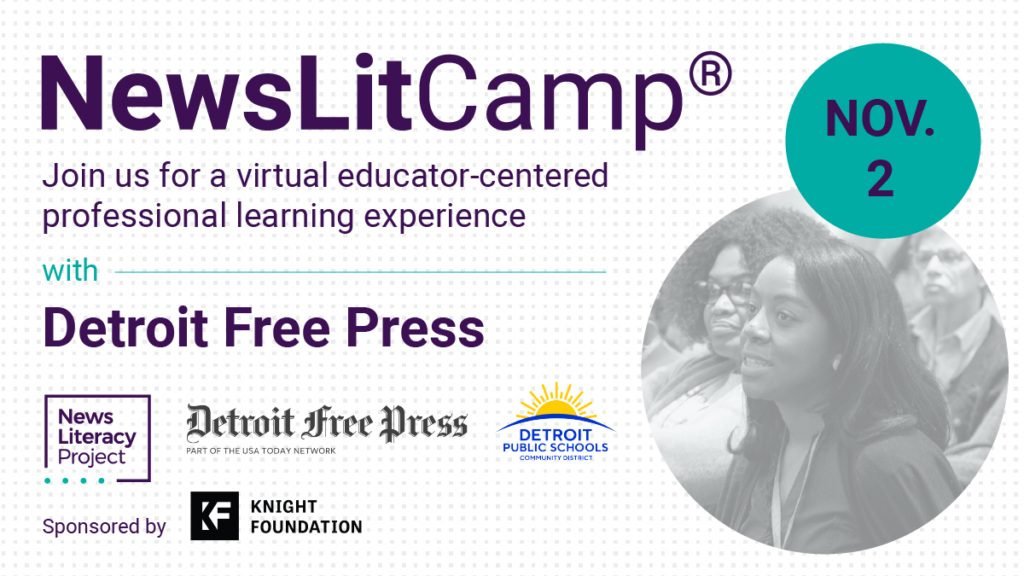
Please note: This event is open only to Detroit Public School educators. If you are a DPS educator, access the following link to register: https://bit.ly/NLCDetroit2021
A virtual, regional, educator-centered professional development experience in collaboration with Detroit Public Schools and the Detroit Free Press
Join the News Literacy Project (NLP) and Detroit Public Schools on Nov. 2 for a virtual, educator-focused NewsLitCamp® led by journalists from the Detroit Free Press and NLP’s news literacy experts, designed to empower you to teach news literacy.
This event is open to all educators in Detroit Public Schools.
Questions? Email us at [email protected] or visit us at newslit.org for more information.
This NewsLitCamp is sponsored by the John S. and James L. Knight foundation.
NewsLitCamp with The 19th*


NewsLitCamp is an immersive, free professional learning experience primarily for middle and high school educators. It features topical sessions (selected with input from participants) led by journalists and news literacy experts, designed to develop expertise in news literacy education, share specialized teaching resources and provide a behind-the-scenes view of the news reporting process. You’ll leave NewsLitCamp with new ideas, skills and resources to help your students navigate today’s complex and challenging information landscape and demystify what distinguishes quality journalism from rumors, hoaxes and other types of misinformation.
Sign up today (it’s FREE!) to reserve your seat!
When: Aug 27, 2021 08:30 AM CST
Who can attend: This NewsLitCamp is designed primarily for middle and high school teachers and media specialists in the U.S. Space permitting, we also will welcome school administrators, post-secondary and international educators.
Please email [email protected] with questions.
This event is made possible with support from the Google News Initiative and is part of a series of NewsLitCamp events led by the News Literacy Project in collaboration with a diverse group of news organizations around the country.
Pre-pandemic NewsLitCamp planted seed for team teaching
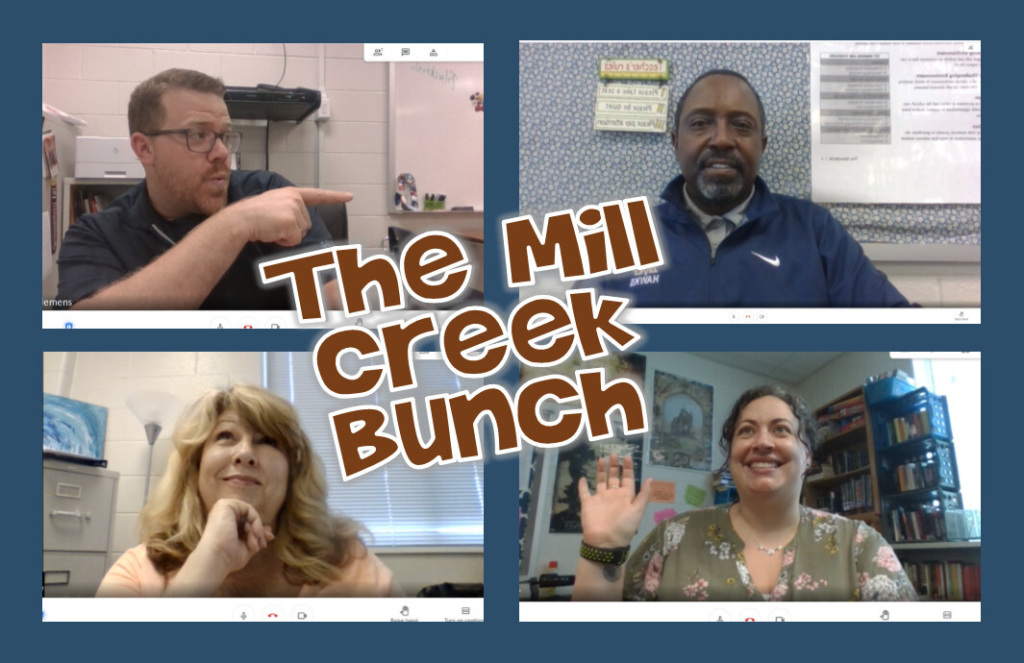

Talk about good timing. In early 2020, Erin Wilder encouraged her fellow high school English teachers to hop in the car and head from Hoschton, Georgia, to Columbia, South Carolina, for a NewsLitCamp®. Wilder was certain a drive of a few hours would prove valuable to her colleagues — Warren Clemens, Joe Jenifer and Ramona Avery.
We all know what happened soon after. By early spring, the pandemic forced schools to close for the remainder of the school year and begin in the fall of 2020 with distance learning or hybrid models of teaching. To keep students engaged, educators have had to get creative and collaborate more than ever.
That’s where Wilder’s expertise with NLP’s Checkology® came in. Her team was new to the e-learning platform, so her experience was invaluable for building a media literacy curriculum in an asynchronous learning environment. “Because I had experience with it, I had a plan from the outset,” Wilder says.
Her colleagues were glad to have that guidance. As team leader, Wilder organized content and sequenced lessons to achieve learning outcomes.
“Erin was using Checkology a lot. I hadn’t pulled the trigger until this year, and I needed to learn how to use it in the classroom,” Clemens says.
The NewsLitCamp was worth the drive, says Jenifer. It gave him insight on how to approach the topic. “That experience really helped me to better implement the media literacy curriculum and use Checkology,” he says.
The curriculum is part of a required class for about 600 Mill Creek High School seniors. “We want them to be literate citizens,” Wilder says. “We want them to understand how these skills transfer when they go out into the world.”
Making connections to their lives
The team taught the Checkology lessons “InfoZones,” “Understanding Bias,” “Misinformation,” “Introduction to Algorithms” and “Conspiratorial Thinking.”
“The [lesson] videos are fun and allow such great discussions,” Clemens says.
The teachers supplemented lessons with material from The Sift® newsletter, NLP educator resources and other content. Studying algorithms and branded content (advertising disguised as news) allowed them to demonstrate connections between class material and what was happening in students’ newsfeeds. “I’d pull a social media account up and say, ‘Look what they’re showing me and what they are suggesting for me,’” Wilder says. “We think it’s random garbage that shows up but it’s not random. They can see that pattern is there on purpose and realize, ‘This is what the machine thinks of me.’”
The lessons led to students to learning how to identify whether a piece of content was credible and determining how it had been manipulated. “They’re able to see through the façade of what is being pushed out,” Wilder says.
When teaching “Understanding Bias,” Clemens had students choose a current event and find related news articles that represented different partisan opinions. That lesson also helped one of Jenifer’s students, whose political opinions were shifting away from his father’s, speak openly with him. “It allowed him to intelligently have those discussions with his dad,” he says, noting that “students have to make their own choices, have their own voices.”
And a watershed moment for Jenifer and his students came when they began looking at consumption of media from the perspective of a balanced diet. “You need a balanced diet to make healthy choices. When you don’t have that, it makes for unhealthy choices and unhealthy decisions,” he says.
Lessons learned
Based on the team’s experiences this spring, they have some advice for those diving into news literacy education next fall:
- Don’t go it alone; teach as part of a team.
- Don’t be afraid to take risks and make mistakes.
- Challenge students intellectually and encourage them to think in different ways.
- Familiarize yourself with all material available through NLP and other resources.
- Use examples from daily life to engage students.
Clearly, their pre-pandemic road trip back in 2020 paid off in ways the teaching colleagues couldn’t have predicted, and they’ll be using the lessons learned in the school year ahead.
Columbia educators: NewsLitCamp® with South Carolina ETV and Public Radio and The Post and Courier
NewsLitCamp helps teachers and librarians develop expertise in news literacy, demystifying what distinguishes quality journalism from misinformation.
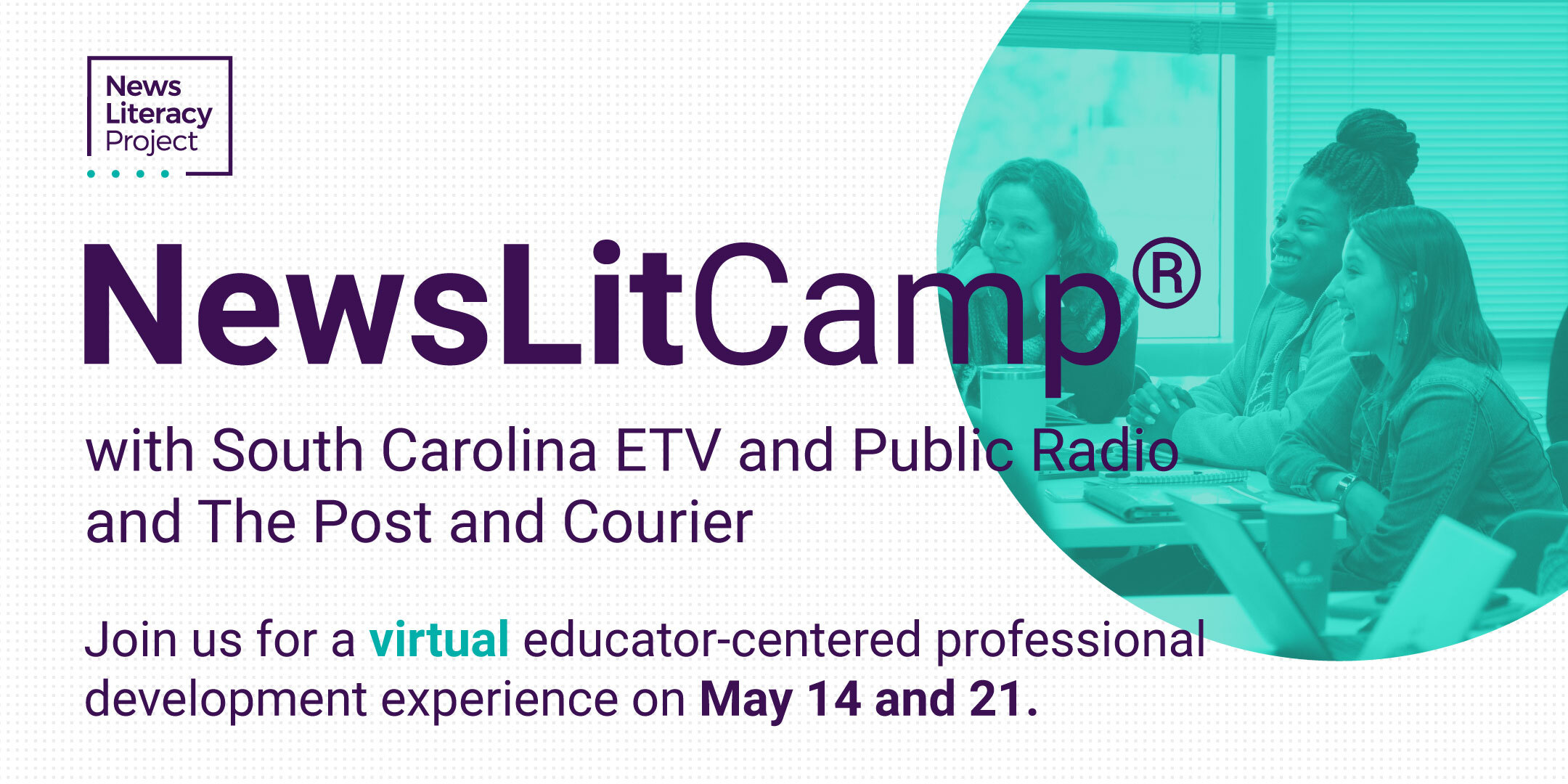

Join the News Literacy Project (NLP), South Carolina ETV and Public Radio, The Post and Courier, and Richland School District Two on May 14 and 21 for NewsLitCamp, a virtual teacher-centered professional learning event over two afternoons featuring breakout sessions with Columbia journalists.
Sign up today (it’s FREE!) to reserve your seat!
NewsLitCamp is an immersive, free professional development experience primarily for middle and high school educators. It features topical sessions (selected with input from participants) led by journalists and news literacy experts, designed to empower you to teach news literacy.
This event is made possible with support from the John S. and James L. Knight Foundation and is part of a series of NewsLitCamp events led by the News Literacy Project in collaboration with a diverse group of news organizations around the country.
Details
Educators in Columbia, South Carolina, are invited to join us for two afternoons of free synchronous sessions and live interactions with local journalists and experts from the News Literacy Project: May 14 from 1-3:45 p.m. ET and May 21 from 1-3:30 p.m. ET.
In early May, educators will be prompted to create a Sched.com account to access related materials and Zoom links. Sched will be the home base for all of the event activities.
Why attend?
As an educator, you directly influence how your students process everything they read, watch and hear. You’ll leave NewsLitCamp with new ideas, skills and resources to help your students navigate today’s complex and challenging information landscape. Our goal is to help teachers and librarians develop expertise in news literacy education, share specialized teaching resources and provide a behind-the-scenes view of the newsgathering process — demystifying what distinguishes quality journalism from rumors, hoaxes and other types of misinformation.
Who can attend
This NewsLitCamp is designed primarily for middle and high school teachers and media specialists in Columbia. Space permitting, we also will welcome school administrators and post-secondary educators. Please email [email protected] with questions.
Bonus Session
You’ll learn about the Checkology® virtual classroom, our free, easy-to-use platform full of engaging news literacy learning experiences. Its 14 lessons can be used remotely or in-person and are easily integrated into variety of subject areas, with lesson topics like:
- Misinformation.
- The standards of quality journalism.
- News judgment.
- Watchdog journalism and its contributions to democracy.
- News media bias.
About South Carolina ETV and Public Radio
As the state’s public educational broadcasting network, South Carolina ETV and Public Radio uses television, radio and the internet to enrich lives by educating children, informing and connecting citizens, celebrating our culture and environment, and instilling the joy of learning. It provides national and local content to classrooms via internet services Knowitall.org, LearningWhy and PBS Learning Media, along with teacher training and recertification in face-to-face and online settings. SCETV and Public Radio began in 1958 with closed-circuit broadcasts to multiple schools of French and plane geometry classes at Dreher High School in Columbia. Today the network comprises 11 TV stations, eight radio stations and a statewide tower network that serves schools, hospitals and emergency management teams.
About The Post and Courier:
As the South’s oldest daily newspaper, it traces its roots to The Courier, founded in 1803, and The Evening Post, founded in 1894. In 1926, the two newspapers were drawn closer together when The Courier, which had then become The News and Courier, was purchased by The Evening Post Industries Company. Both newspapers maintained separate news staffs until the 1980s, when those staffs were combined. In 1991, when it became apparent that reading habits were better served by a single edition of the newspaper – a morning edition – the two papers were merged to become The Post and Courier. The newspaper is now published by The Post and Courier, Inc. Its Columbia edition is reported, written and edited by Columbia journalists for readers in the Midlands.
Questions?
Email Miriam Romais, NLP’s senior manager of education and training, at [email protected] or Katherine Templeton, Richland Two’s coordinator for professional learning, at [email protected].
This NewsLitCamp is presented by the News Literacy Project and is generously supported by the John S. and James L. Knight Foundation.


Minnesota educators: NewsLitCamp® with Star Tribune, MPR News and Sourcewell Technology
NewsLitCamp helps teachers & librarians develop expertise in news literacy, demystifying what distinguishes quality journalism from misinformation.
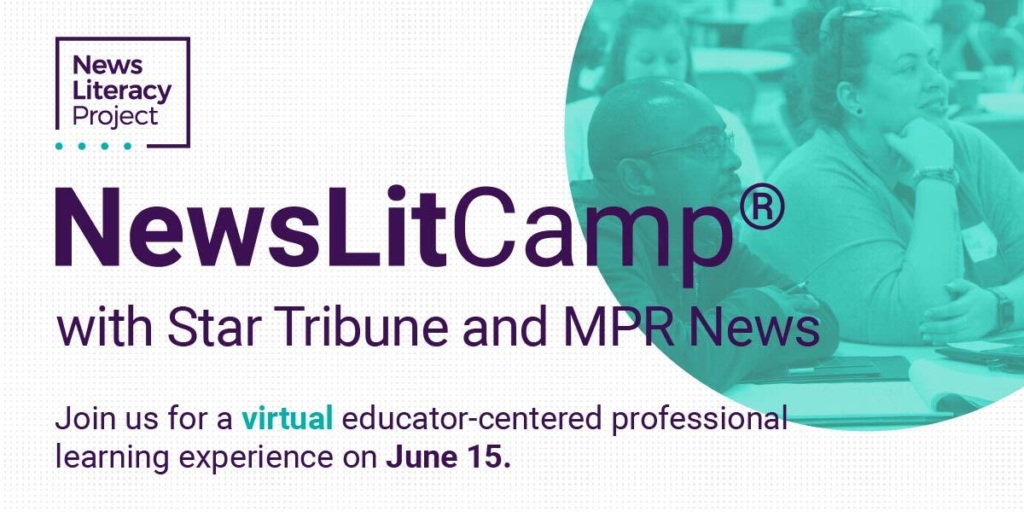

Join the News Literacy Project (NLP), Star Tribune, MPR News and Sourcewell Technology on June 15 for NewsLitCamp, a virtual teacher-centered day of professional learning featuring breakout sessions with Minnesota journalists.
Sign up today (it’s FREE!) to reserve your seat!
NewsLitCamp is an immersive, free professional development experience primarily for middle and high school educators. It features topical sessions (selected with input from participants) led by journalists and news literacy experts, designed to empower you to teach news literacy.
This event is made possible with support from the John S. and James L. Knight Foundation and is part of a series of NewsLitCamps led by the News Literacy Project in collaboration with a diverse group of news organizations around the country.
Details
Educators from St. Paul, Duluth and other Minnesota school districts are invited to join us for a day of free synchronous sessions and live interactions with Star Tribune journalists and experts from the News Literacy Project: 8:30 a.m.-12 p.m. and 1:00-3:30 p.m. CT.
In mid-May, educators will be prompted to create a Sched.com account to access related materials and Zoom links. Sched will be the home base for all of the event activities.
Why attend?
As an educator, you directly influence how your students process everything they read, watch and hear. You’ll leave NewsLitCamp with new ideas, skills and resources to help your students navigate today’s complex and challenging information landscape. Our goal is to help teachers and librarians develop expertise in news literacy education, share specialized teaching resources and provide a behind-the-scenes view of the newsgathering process — demystifying what distinguishes quality journalism from rumors, hoaxes and other types of misinformation.
Who can attend
This NewsLitCamp is designed primarily for middle and high school teachers and media specialists in Minnesota. Space permitting, we also will welcome school administrators, post-secondary and international educators. Please email [email protected] with questions.
Bonus Session
You’ll learn about the Checkology® virtual classroom, our free, easy-to-use platform full of engaging news literacy learning experiences. Its 14 lessons can be used remotely or in-person and are easily integrated into variety of subject areas, with lesson topics like:
- Misinformation.
- The standards of quality journalism.
- News judgment.
- Watchdog journalism and its contributions to democracy.
- News media bias.
About Star Tribune Media Company
Star Tribune Media Company LLC is a locally owned, award-winning media company serving Minnesota and the upper Midwest. With the most-visited local news website, the third-largest Sunday and sixth-largest daily circulation metro print newspaper in the U.S., a range of home-delivered advertising solutions, and a growing portfolio of events, Star Tribune reaches more consumers than any other Minnesota media brand. For more information, visit www.startribunecompany.com
Questions?
Email Miriam Romais, NLP’s senior manager of education and training, at [email protected], Kate Indrelie, Sourcewell Technology’s education technology consultant, at [email protected], or Ann Kaste, Minnetonka High School’s information and digital learning coordinator, at [email protected]
This NewsLitCamp is presented by the News Literacy Project and is generously supported by the John S. and James L. Knight Foundation.


All educators: NewsLitCamp® with The Wall Street Journal
NewsLitCamp helps teachers and librarians develop expertise in news literacy, demystifying what distinguishes quality journalism from misinformation.
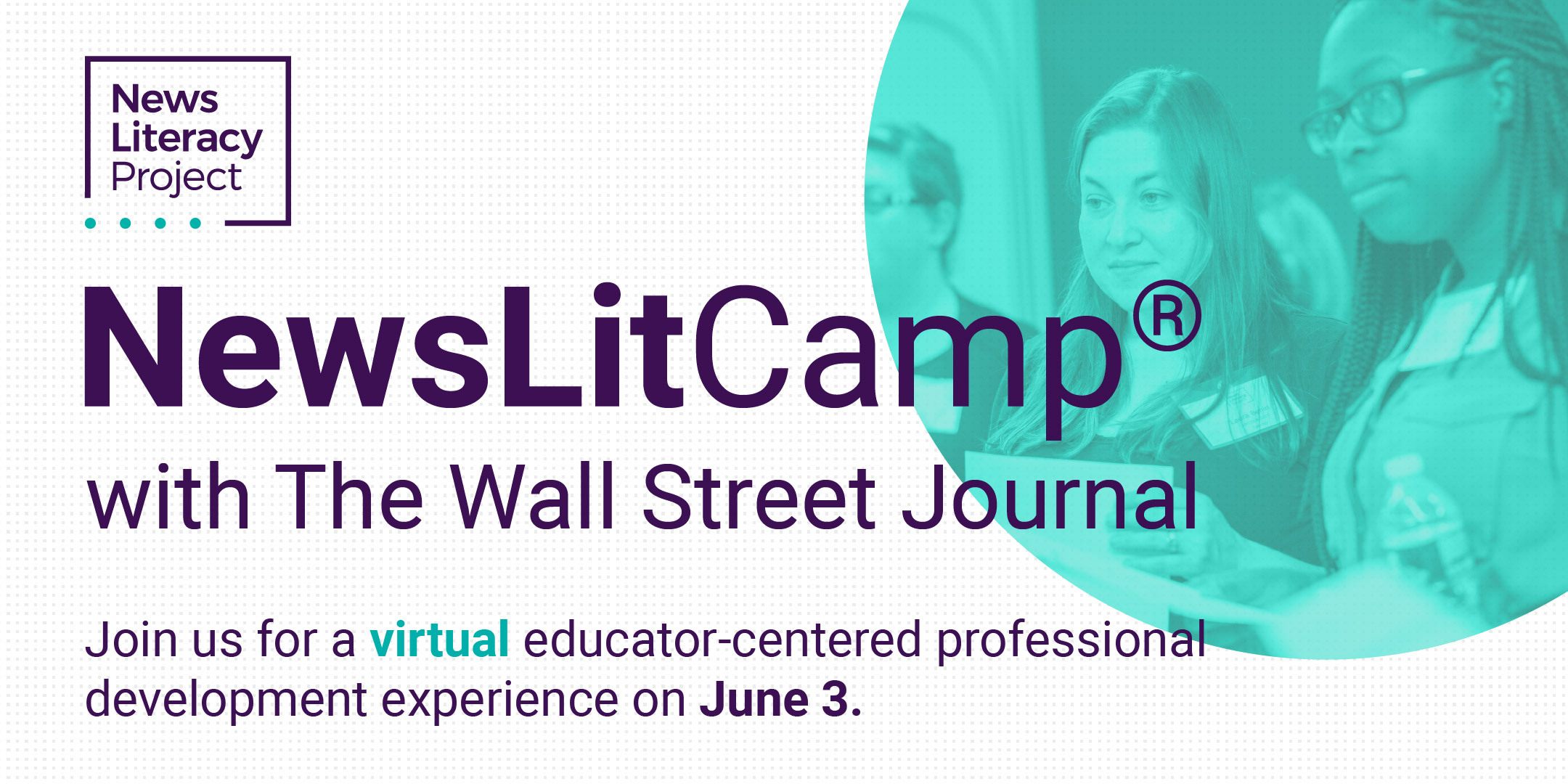

Join the News Literacy Project (NLP), The Wall Street Journal and the New York City Department of Education on June 3 for NewsLitCamp, a national virtual teacher-centered day of professional learning featuring breakout sessions with journalists from the Wall Street Journal. This program is part of a series of NewsLitCamp events led by the News Literacy Project in collaboration with a diverse group of news organizations around the country.
Sign up today (it’s FREE!) to reserve your seat!
NewsLitCamp is an immersive, free professional development experience primarily for middle and high school educators. It features topical sessions (selected with input from participants) led by journalists and news literacy experts, designed to empower you to teach news literacy.
Details
Educators from across the U.S. are invited to join us for a day of free synchronous sessions and live interactions with WSJ journalists and experts from the News Literacy Project: 8:30 a.m.-12 p.m. and 12:45-3 p.m. ET. (7:30-11 a.m. and 11:45-2 p.m. CT; and 5:30-9 a.m. and 9:45-12 p.m. PT).
NYC DOE participants can receive up to six hours of CTLE credit (you must sign up with your DOE email: schools.nyc.gov). Participants from other schools can apply for credit within their districts.
In mid-April, educators will be prompted to create a Sched.com account to access related materials and Zoom links. Sched will be the home base for all of the event activities.
Why attend?
As an educator, you directly influence how your students process everything they read, watch and hear. You’ll leave NewsLitCamp with new ideas, skills and resources to help your students navigate today’s complex and challenging information landscape. Our goal is to help teachers and librarians develop expertise in news literacy education, share specialized teaching resources and provide a behind-the-scenes view of the newsgathering process — demystifying what distinguishes quality journalism from rumors, hoaxes and other types of misinformation.
Who can attend
This NewsLitCamp is designed primarily for middle and high school teachers and media specialists in the U.S. Space permitting, we also will welcome school administrators, post-secondary and international educators. Please email [email protected] with questions.
Bonus Session
Attend either our introductory or advanced session on the Checkology® virtual classroom, our free, easy-to-use platform full of engaging news literacy learning experiences. Its 14 lessons can be used remotely or in person and are easily integrated into variety of subject areas, with lesson topics like:
- Misinformation.
- The standards of quality journalism.
- News judgment.
- Watchdog journalism and its contributions to democracy.
- News media bias.
About The Wall Street Journal
Founded in 1889, The Wall Street Journal serves as the definitive source of news and information, reporting through the lens of business, finance, economics and money—global forces that shape the world and are key to understanding it. Its global digital offerings have grown to include 12 sites in six languages, edited locally for a regionally relevant focus. Wsj.com delivers breaking news streams, interactive features, videos, podcasts and blogs, as well as clear labeling to help readers differentiate between news and opinion content online. Published by Dow Jones, the Journal offers unparalleled analysis and unique reporting informing decisions that drive the world forward. It has won 38 Pulitzer Prizes in a variety of categories, including national reporting, international reporting, explanatory reporting, commentary and public service.
Questions?
Email Miriam Romais, NLP’s senior manager of education and training, at [email protected].
This NewsLitCamp is presented by the News Literacy Project and is generously supported by News Corp.


NewsLit Week | All educators: NewsLitCamp® with CNN Worldwide
About this Event
Join the News Literacy Project (NLP) and CNN Worldwide on Jan. 26 for a national, virtual, teacher-centered NewsLitCamp featuring breakout sessions with CNN television and digital journalists. This program is one in a national series of NewsLitCamps led by the News Literacy Project in collaboration with a diverse group of news organizations around the country.
Sign up here (it’s FREE!) to reserve your seat!
NewsLitCamp is a free professional development experience primarily for middle and high school educators. It features live topical sessions (selected with input from participants) and educator-driven planning time to empower you to teach news literacy. This format gives education professionals an opportunity to come together for a day of conversations with journalists and news literacy experts. Check out our NewsLitCamp video below for a quick look at what the event can offer you.
Details
Join us for a day of free workshops and live interactions with CNN television and digital journalists along with news literacy experts from the News Literacy Project. Register now on Eventbrite (green button); educators will be later be prompted to create a free Sched.com account, which will be the home base for all of the event activities, including access to the Zoom links on the day of the event. Recordings will not be made available, so be sure to save the date!
Sessions will be held from 8:00 a.m.-12:15 p.m. and from 1:30-4:15 p.m. ET; the second session is not a repeat event.
Why attend? As an educator, you directly influence how your students process everything they read, watch and hear. You’ll leave NewsLitCamp with new ideas, skills and resources to help your students navigate today’s complex and challenging information landscape. Our goal is to help teachers and librarians develop expertise in news literacy education, share specialized teaching resources and provide a behind-the-scenes view of the newsgathering process — demystifying what distinguishes quality journalism from rumors, hoaxes and other types of misinformation.
Participating educators will receive a certificate of attendance so they can apply for continuing education credits within their districts.
Who can attend: NewsLitCamp is designed primarily for middle and high school teachers and media specialists. Space permitting, we also will welcome school administrators and post-secondary and international educators. Please email [email protected] with questions.
Bonus Session: You’ll learn about our Checkology® virtual classroom, a free cutting-edge comprehensive e-learning platform that complements educators’ lesson plans. The topics it examines include:
- Misinformation and bias.
- The practice of quality journalism.
- The First Amendment.
- Watchdog journalism and its contributions to democracy.
- Press freedoms around the world.
About CNN Worldwide
This NewsLitCamp is presented by the News Literacy Project and made possible with the generous support of SmartNews.
Top photo: NPR’s Washington Investigative Correspondent Tim Mak with educators at NPR in Washington, D.C., 2019.
Photo Credit: Miriam Romais / The News Literacy Project.
Illinois educators: NewsLitCamp® with Chicago Defender, ProPublica Illinois, Better Government Association, Rockford Register Star and Block Club Chicago
Join the News Literacy Project (NLP) and Chicago Public School Libraries on Feb. 5 for a virtual teacher-centered NewsLitCamp featuring breakout sessions with journalists from Chicago Defender, ProPublica Illinois, Better Government Association, Rockford Register Star and Block Club Chicago. This program is part of a series of NewsLitCamp events led by the News Literacy Project in collaboration with a diverse group of news organizations around the country.
Sign up today (it’s FREE!) to reserve your seat.
NewsLitCamp is an immersive, free professional development experience primarily for middle and high school educators. It features topical sessions (selected with input from participants) led by Illinois-based journalists and news literacy experts, and educator-driven sessions to empower you to teach news literacy. Check out our NewsLitCamp video for a quick look at what the event can offer you.
Details
Join us for a day of free workshops and interactions with Illinois journalists and experts from the News Literacy Project: 8:30 a.m.-12 p.m. and 1:00-3:45 p.m. CT (9:30 a.m-1 p.m. and 2:00-4:45 p.m. ET / 6:30-10 a.m. and 11:00 a.m.-1:45 p.m. PT).
Educators will be prompted in mid-January to create a Sched.com account, which will be the home base for all of the event activities, including documents and access to the Zoom links.
Why attend? As an educator, you directly influence how your students process everything they read, watch and hear. You’ll leave NewsLitCamp with new ideas, skills and resources to help your students navigate today’s complex and challenging information landscape. Our goal is to help teachers and librarians develop expertise in news literacy education, share specialized teaching resources and provide a behind-the-scenes view of the newsgathering process — demystifying what distinguishes quality journalism from rumors, hoaxes and other types of misinformation.
Educators able to participate for the full day will receive a certificate of attendance to apply for continuing education credits within their districts.
Who can attend: NewsLitCamp is designed primarily for middle and high school teachers and media specialists. Space permitting, we also will welcome school administrators and post-secondary and international educators. Please email [email protected] with questions.
Bonus: You’ll learn about our Checkology® virtual classroom, a free cutting-edge comprehensive e-learning platform that complements educators’ lesson plans. The topics it examines include:
- Misinformation and bias.
- The practice of quality journalism.
- The First Amendment.
- Watchdog journalism and its contributions to democracy.
- Press freedoms around the world.
About the Chicago Defender: The Chicago Defender is multi-media content provider of news, information and events that cover the interests of the urban African American community with culturally relevant content not regularly serviced by mainstream media. Founded in 1905,The Chicago Defender celebrated its 115th Anniversary in 2020 and the evolution being recognized nationally as the 2nd most widely read and best African-American Newspaper by Nielson and Essence Survey 2014.In July 2019, The Chicago Defender transitioned from a printed newspaper into a digitally-focused content platform dedicated to online editorial, premiere events, custom publishing and archival merchandising. Every day, we distribute news and information via multiple platforms. As the voice of the community for more than eleven decades, we take great pride in having access to the grassroots community as well as connections and established relationships with influencers and opinion leaders.
About the Better Government Association: The Better Government Association is a nonpartisan nonprofit news organization and civic advocate working for transparency, efficiency and accountability in government in Chicago and across Illinois.
About Block Club Chicago: Block Club is a nonprofit news organization dedicated to delivering reliable, nonpartisan and essential coverage of Chicago’s diverse neighborhoods. Our full-time reporters are embedded in the communities they cover, allowing them to report with context, respect and with actual knowledge of a neighborhood beyond parachuting in for a “big” story or event. This ground-level approach not only builds community and trust but leads to a more accurate portrayal of a neighborhood.
About ProPublica Illinois: ProPublica Illinois is an independent nonprofit newsroom that produces investigative journalism with moral force. Headquartered in Chicago, we are the first regional publishing operation of ProPublica, dedicated to stories about big issues that affect people living and working in the state of Illinois. ProPublica Illinois was founded in 2017 as a vehicle for leveraging ProPublica’s collaborative model at a regional level, with the goal of making a meaningful difference across the state. With a team of 12 reporters, editors and technologists, we are pursuing stories that hold powerful institutions to account, from politics to government to business.
About the Rockford Register Star: The Rockford Register Star has been northern Illinois’ leading source of news and information for more than 160 years. Owned by Gannett, it was created in 1979 by the merger of the Register Republic founded in 1855, and the Morning Star, founded in 1888.
This NewsLitCamp is presented by the News Literacy Project and is generously supported by the Robert R. McCormick Foundation.
San José educators: NewsLitCamp® with NBC Bay Area
NewsLitCamp helps teachers & librarians develop expertise in news literacy, demystifying what distinguishes quality journalism from misinfo.
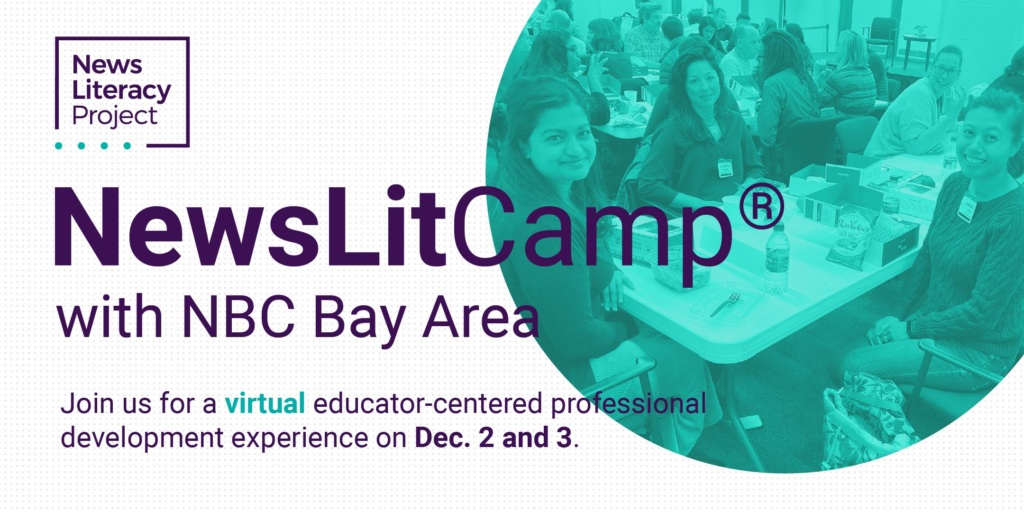

About this Event
Join the News Literacy Project (NLP), the San José Public Library and NBC Bay Area on Dec. 2 and 3 for a virtual, teacher-centered NewsLitCamp featuring breakout sessions with local journalists. This program is part of a series of NewsLitCamp events led by the News Literacy Project in collaboration with a diverse group of news organizations around the country.
Sign up here (it’s FREE!) to reserve your seat!
NewsLitCamp is a free professional development experience primarily for middle and high school educators. It features topical sessions (selected with input from participants) and educator-driven planning time to empower you to teach news literacy. This format gives education professionals an opportunity to come together for a day of conversations with journalists and news literacy experts. Check out our NewsLitCamp video below for a quick look at what the event can offer you.
Details
Join us for several hours of free workshops and interactions with NBC Bay Area anchors, reporters and experts from the News Literacy Project. After registering on Eventbrite, educators will be prompted to create a Sched.com account, which will be the home base for all of the event activities, including access to the Zoom links on the day of the event.
Sessions will be held on Wed. and Thurs. Dec. 2 and 3 from 3-6 p.m. PT.
Why attend? As an educator, you directly influence how your students process everything they read, watch and hear. You’ll leave NewsLitCamp with new ideas, skills and resources to help your students navigate today’s complex and challenging information landscape. Our goal is to help teachers and librarians develop expertise in news literacy education, share specialized teaching resources and provide a behind-the-scenes view of the newsgathering process — demystifying what distinguishes quality journalism from rumors, hoaxes and other types of misinformation.
Participating educators will receive a certificate of attendance so they can apply for continuing education credits within their districts.
Who can attend: NewsLitCamp is designed primarily for middle and high school teachers and media specialists. Space permitting, we also will welcome school administrators and post-secondary and international educators. Please email [email protected] with questions.
Bonus: You’ll learn about our Checkology® virtual classroom, a free cutting-edge comprehensive e-learning platform that complements educators’ lesson plans. The topics it examines include:
- Misinformation and bias.
- The practice of quality journalism.
- The First Amendment.
- Watchdog journalism and its contributions to democracy.
- Press freedoms around the world.
About NBC Bay Area
Owned by NBC Universal, NBC Bay Area/KNTV is the Bay Area’s investigative station located in the heart of Silicon Valley. The station is committed to providing continuous, in-depth journalism with unique personalities. Along with broadcasting NBC’s award-winning daytime, prime-time and late-night programming, NBC Bay Area produces more than 32 hours of news programming each week for television along with continuous news coverage at nbcbayarea.com and multiple other digital platforms.
About SJPL
San José Public Library enriches lives by fostering lifelong learning and by ensuring that every member of the community has access to a vast array of ideas and information.
This NewsLitCamp is presented by the News Literacy Project and is sponsored by the John S. and James L. Knight Foundation.
Top photo: Educators with business reporter Shwanika Narayan at our NewsLitCamp at the San Francisco Chronicle, Nov. 2019. Photo Credit: Miriam Romais / The News Literacy Project.
Miami NewsLitCamp featured in local TV segment
WLRN TV in Miami devoted a Nov. 1 segment to covering the NewsLitCamp held for Miam-Dade area educators the previous week. In ‘It’s A Necessity’: Miami-Dade Teachers Learn How To Spot Misinformation Online, participating educator Silvia Villacis says she looks forward to passing her new skills on to her students. She teaches civics at West Miami Middle School. “If you don’t bother to talk about what’s real, what’s not real, what’s trustworthy, authentic, … you’re doing a disservice to them,” Villacis says, referring to her students. “It’s not a choice anymore. It’s a necessity.”
All educators: NewsLitCamp® with The Texas Tribune
About this event
NewsLitCamp is now nationwide! Join the News Literacy Project (NLP) and The Texas Tribune on Thursday, Dec. 10, for our first nationwide — and virtual — teacher-centered NewsLitCamp featuring breakout sessions with Texas Tribune journalists. This program is part of a series of NewsLitCamp events led by the News Literacy Project in collaboration with a diverse group of news organizations around the country.
Register here (it’s FREE!) on Eventbrite.
Space is limited. Sign up today to reserve your seat!
NewsLitCamp is a free professional development experience primarily for middle and high school educators. It features topical sessions (selected with input from participants) and educator-driven planning time to empower you to teach news literacy. This format gives education professionals an opportunity to come together for a day of conversations and learning with journalists and news literacy experts.
Details
Educators will convene on Zoom for several hours of free workshops and interactions with Texas Tribune journalists and experts from the News Literacy Project.
Sessions will be held at 8:30-11:45 a.m. and 1:30-3:45 p.m. CT.
Why attend? As an educator, you directly influence how your students process everything they read, watch and hear. You’ll leave NewsLitCamp with new ideas, skills and resources to help your students navigate today’s complex and challenging information landscape. Our goal is to help teachers and librarians develop expertise in news literacy education, share specialized teaching resources and provide a behind-the-scenes view of the news-gathering process — demystifying what distinguishes quality journalism from rumors, hoaxes and other types of misinformation.
Participating educators will receive a certificate of attendance so they can apply for continuing education credits within their districts.
Who can attend: NewsLitCamp is designed primarily for middle and high school teachers and media specialists. Space permitting, we also will welcome school administrators and post-secondary and international educators. Please email [email protected] with questions.
Bonus: You’ll learn about our Checkology® virtual classroom, a cutting-edge comprehensive e-learning platform that complements educators’ lesson plans. Among the topics it covers are:
- Misinformation and bias.
- The practice of quality journalism.
- The First Amendment.
- Watchdog journalism and its contributions to democracy.
- Press freedoms around the world.
About The Texas Tribune
The Texas Tribune is the only member-supported, digital-first, nonpartisan media organization that informs Texans — and engages with them — about public policy, politics, government and statewide issues.
This NewsLitCamp is presented by the News Literacy Project and is sponsored by SmartNews.
Photo: Educators at our NewsLitCamp at Bloomberg News in New York City, Jan. 2020. Photo Credit: Andrea Lin / The News Literacy Project.
Miami educators: NewsLitCamp® with Univision
Miami-area educators, join the News Literacy Project for a virtual NewsLitCamp® event!
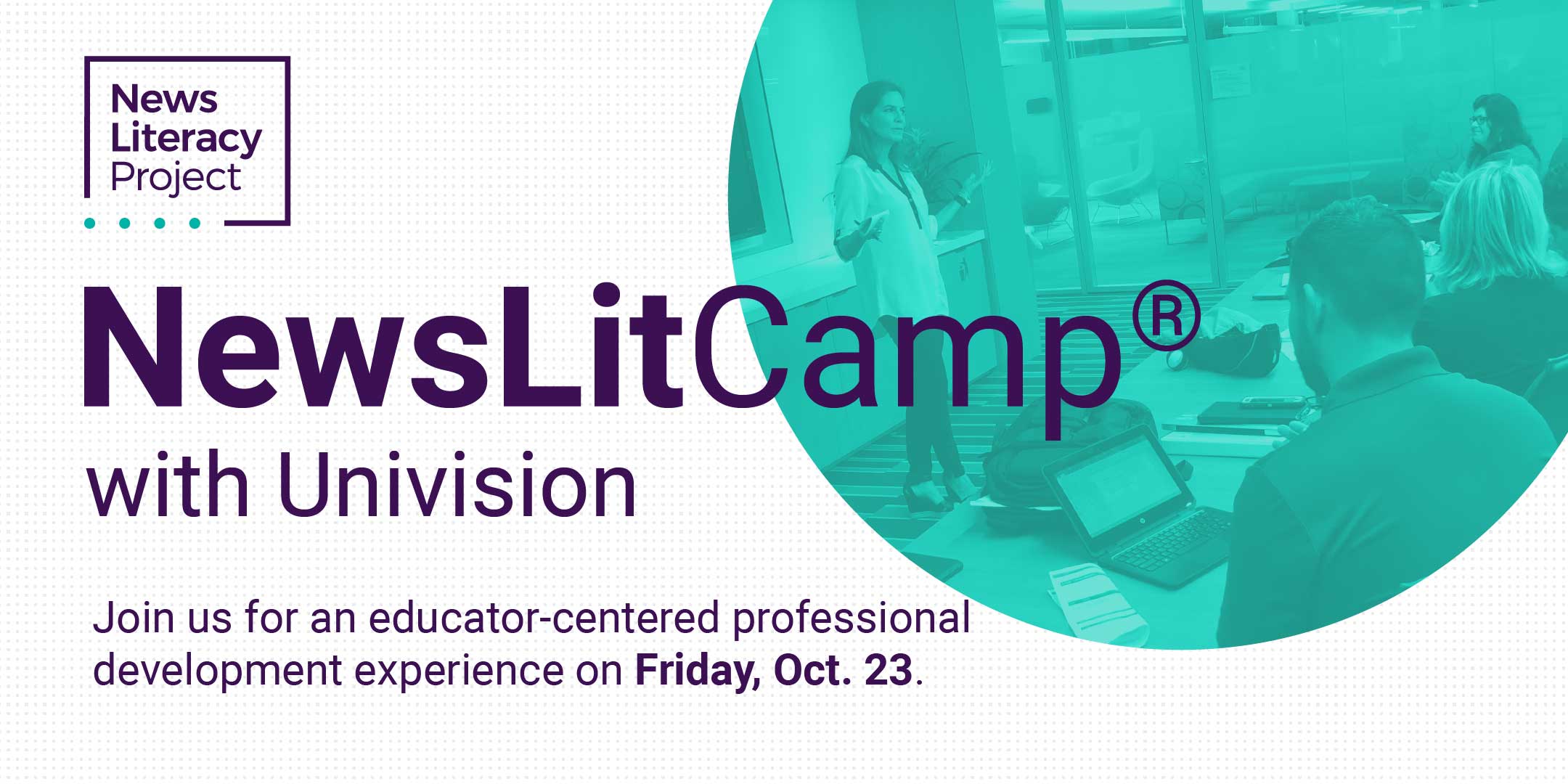

About this Event
Join the News Literacy Project (NLP), Univision News and Miami-Dade County Public Schools on Oct. 23 for a virtual teacher-centered NewsLitCamp featuring breakout sessions with Univision News journalists. This program is one in a national series of NewsLitCamps led by the News Literacy Project in collaboration with a diverse group of news organizations around the country.
Register here (It’s FREE!) on Eventbrite.
Space is limited. Sign up today to reserve your seat!
NewsLitCamp is a free professional development experience primarily for middle and high school educators. It features topical sessions (selected with input from participants) and educator-driven planning time to empower you to teach news literacy. This format gives education professionals an opportunity to come together for a day of conversations with journalists and news literacy experts. Check out our NewsLitCamp video for a quick look at what the day can offer you and your students.
Details
Educators will convene on Zoom for several hours of free workshops and interactions with Univision reporters and editors, and experts from the News Literacy Project.
Sessions will be held at 8:30-11:45 a.m. and 1:30-3:45 p.m. ET.
Why attend? As an educator, you directly influence how your students process everything they read, watch and hear. You’ll leave NewsLitCamp with new ideas, skills and resources to help your students navigate today’s complex and challenging information landscape. Our goal is to develop teachers’ and librarians’ expertise in news literacy education, share specialized teaching resources and provide a behind-the-scenes view of the newsgathering process — demystifying what distinguishes quality journalism from rumors, hoaxes and other types of misinformation.
Miami-Dade County Public School educators: please be sure to utilize your M-DCPS email address when registering in order to receive master plan points.
Who can attend: NewsLitCamp is designed primarily for middle and high school teachers and media specialists. Space permitting, we welcome other educators and school administrators.
Bonus: You’ll learn about our Checkology® virtual classroom, a cutting-edge comprehensive e-learning platform that complements educators’ lesson plans. The topics it examines include:
- Misinformation and bias.
- The practice of quality journalism.
- The First Amendment.
- Watchdog journalism and its contributions to democracy.
- Press freedoms around the world.
About Univision Communications Inc.
Univision is the leading media company serving Hispanic America. The company’s broadcast assets include Univision Network, one of the top television networks in the U.S. regardless of language and the most-watched Spanish-language broadcast network in the country; Univision Local Media, which owns and/or operates 65 television stations and 58 radio stations in major U.S. Hispanic markets and Puerto Rico; and Univision.com, the most-visited Spanish-language website among U.S. Hispanics. The award-winning news division of Univision Communications Inc. is committed to informing the country’s fastest-growing segment across all media platforms. Hispanics count on the latest and most relevant content that impacts the community through Noticiero Univision, the network’s evening, late evening and weekend national newscast; the Sunday public affairs program Al Punto (To The Point); newsmagazine shows Aquí y Ahora (Here and Now) and Primer Impacto (First Impact); as well as morning news segments on Despierta América (Wake Up America). Univision News has strengthened its news team and expanded its operations by adding investigative, documentary, infographics and data journalism units.
This NewsLitCamp is presented by the News Literacy Project and is sponsored by the John S. and James L. Knight Foundation.
Photo: Aquí y Ahora correspondent Tifani Rogers with educators at our NewsLitCamp at Univision in Miami, April 2019. Photo Credit: Miriam Romais / The News Literacy Project.
POSTPONED: Detroit educators: NewsLitCamp® with WXYZ-TV Channel 7 and the Detroit Free Press
This event has been postponed indefinitely due to the Coronavirus (COVID-19) pandemic. Please check back later for information on a new date.
Join the News Literacy Project, WXYZ-TV Channel 7, the Detroit Free Press and Detroit Public Schools Community District for a highly engaging, educator-centered NewsLitCamp featuring breakout sessions with local journalists.
Registration details coming soon!
NewsLitCamp is a day-long professional development experience based on an “edcamp” style of continuing education. It features topical sessions (selected with input from participants) and educator-driven planning and development time to empower you to teach news literacy. This format gives education professionals an opportunity to come together for a day of conversations with journalists and news literacy experts.
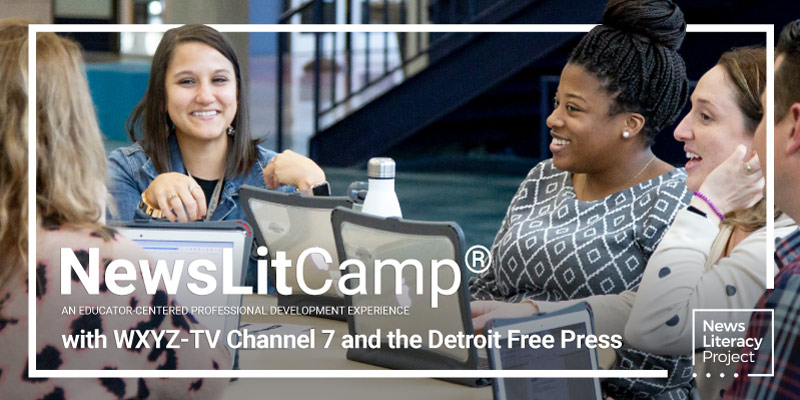

Details
Educators will meet at WXYZ-TV Channel 7 on Saturday, May 16, for a full day of free workshops and interactions with experts from the News Literacy Project and journalists from WXYZ-TV Channel 7 and the Detroit Free Press. WXYZ-TV Channel 7 is located at 20777 West 10 Mile Road, Southfield, MI 48075.
Breakfast and networking begin at 8 a.m.; NewsLitCamp starts promptly at 8:30 a.m. Lunch will be provided.
Why attend?
As an educator, you directly influence how your students process what they read, watch and hear. At the end of our NewsLitCamp, you’ll leave with new ideas, skills and resources to help your students navigate today’s complex information landscape and beat back a rising tide of misinformation. Our goal is to develop teachers’ and librarians’ expertise in news literacy education, share specialized teaching resources and provide a behind-the-scenes view of the news reporting process. These sessions aim to demystify and explain what distinguishes quality journalism.
Check out our NewsLitCamp video for a quick look at what the day can offer you and your students.
Who can attend
NewsLitCamps are designed primarily for middle school and high school teachers and media specialists. Space permitting, we welcome other educators and school administrators.
Bonus: You’ll learn about our Checkology® virtual classroom, a cutting-edge comprehensive news literacy e-learning platform that complements educators’ lesson plans. The topics it examines include:
- Misinformation.
- Bias.
- The practice of quality journalism.
- The First Amendment.
- Watchdog journalism and its contributions to democracy.
- Press freedoms around the world.
This NewsLitCamp is presented by the News Literacy Project and is supported by the John S. and James L. Knight Foundation with additional promotional support offered by the Michigan State University School of Journalism.
Photo Caption: Educators at our NewsLitCamp in Columbia, South Carolina, January 2020.
Photo Credit: Andrea Lin/News Literacy Project.
POSTPONED: Chicago educators: NewsLitCamp® with Block Club Chicago, The Better Government Association, The Chicago Reporter and ProPublica Illinois
This event has been postponed indefinitely due to the Coronavirus (COVID-19) pandemic. Please check back later for information on a new date.
Join the News Literacy Project, Block Club Chicago, the Better Government Association, The Chicago Reporter, ProPublica Illinois and Chicago Public Schools, for a highly engaging, teacher-centered NewsLitCamp featuring breakout sessions with local journalists.
Register today at this link (it’s FREE!) to reserve your seat: http://bit.ly/ChicagoNLC20.
Space is limited. Sign up today to reserve your seat!
NewsLitCamp is a day-long professional development experience based on an “edcamp” style of continuing education. It features topical sessions (selected with input from participants) and educator-driven planning and development time to empower you to teach news literacy. This format gives education professionals an opportunity to come together for a day of conversations with journalists and news literacy experts.
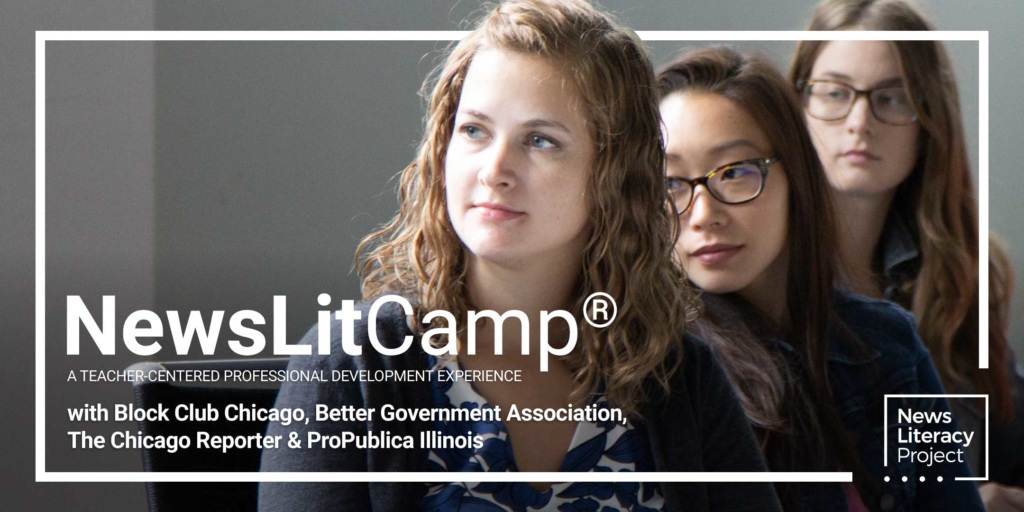

Details
Educators will meet at the Chicago Literacy Alliance on Friday, Apr. 17, for a full day of free workshops and interactions with experts from the News Literacy Project and journalists from Block Club Chicago, The Chicago Reporter, the Better Government Association (BGA) and ProPublica Illinois.
Breakfast and networking begin at 8 a.m.; NewsLitCamp starts promptly at 8:30 a.m. Lunch will be provided. The Chicago Literacy Alliance is located at 641 W. Lake St. in Chicago.
Why attend?
As an educator, you directly influence how your students process what they read, watch and hear. At the end of our NewsLitCamp, you’ll leave with new ideas, skills and resources to help your students navigate today’s complex information landscape and beat back a rising tide of misinformation. Our goal is to develop teachers’ and librarians’ expertise in news literacy education, share specialized teaching resources and provide a behind-the-scenes view of the news reporting process. These sessions aim to demystify and explain what distinguishes quality journalism.
Check out our NewsLitCamp video for a quick look at what the day can offer you and your students.
Who can attend
NewsLitCamps are designed primarily for middle school and high school teachers and media specialists. Space permitting, we welcome other educators and school administrators. Chicago Public Schools educators can receive CPDUs if they register via the Learning Hub in addition to Eventbrite (code provided after registration); participants from other schools may apply for credit within their districts.
Bonus: You’ll learn about our Checkology® virtual classroom, a cutting-edge comprehensive news literacy e-learning platform that complements educators’ lesson plans. The topics it examines include:
- Misinformation.
- Bias.
- The practice of quality journalism.
- The First Amendment.
- Watchdog journalism and its contributions to democracy.
- Press freedoms around the world.
About The Chicago Reporter
Founded on the heels of the civil rights movement of the 1960s, The Chicago Reporter confronts racial and economic inequality, using the power of investigative journalism. Our mission is national but grounded in Chicago, one of the most segregated cities in the nation and a bellwether for urban policies.
About Block Club Chicago
Block Club is a nonprofit news organization dedicated to delivering reliable, nonpartisan and essential coverage of Chicago’s diverse neighborhoods. Our reporters don’t parachute in once to cover a story; they are in the neighborhoods they cover every day, building relationships and amplifying positive stories. We believe this ground-level approach not only builds community but also leads to a more accurate portrayal of a neighborhood.
About the Better Government Association
The Better Government Association is a nonpartisan nonprofit news organization and civic advocate working for transparency, efficiency and accountability in government in Chicago and across Illinois.
About ProPublica Illinois
ProPublica Illinois is an independent nonprofit newsroom that produces investigative journalism with moral force. Headquartered in Chicago, we are the first regional publishing operation of ProPublica, dedicated to stories about big issues that affect people living and working in the state of Illinois. ProPublica Illinois was founded in 2017 as a vehicle for leveraging ProPublica’s collaborative model at a regional level, with the goal of making a meaningful difference across the state. With a team of 12 reporters, editors and technologists, we are pursuing stories that hold powerful institutions to account, from politics to government to business.
About the Chicago Literacy Alliance
CLA is an association of more than 120 organizations (including NLP’s education team) that work across disciplines, age groups, education levels, and neighborhoods across Chicago to create crucial literacy services and educational programs that improve lives. The alliance provides work and meeting space and offers professional development and programming tailor-made to increase capacity, foster collaboration, and ultimately, expand the impact of these organizations.
This NewsLitCamp is presented by the News Literacy Project and is supported by the Robert R. McCormick Foundation.
Photo Caption: Educators at our NewsLitCamp at NPR in Washington, D.C., August 2019. Photo Credit: Andrea Lin/The News Literacy Project.
Illinois educators: NewsLitCamp® with the Rockford Register Star
Join the News Literacy Project, the Rockford Register Star and Rockford Public Schools (RPS) on Tuesday, Feb. 11, for a highly engaging, teacher-centered NewsLitCamp featuring breakout sessions with local journalists. This program is one in a national series of NewsLitCamps led by the News Literacy Project in collaboration with a diverse group of news organizations around the country.
Register today at this link (it’s FREE!) to reserve your seat: http://bit.ly/newslitcampRockford.
Space is limited. Sign up today to reserve your seat!
NewsLitCamp is a day-long professional development experience based on an “edcamp” style of continuing education. It features topical sessions (selected with input from participants) and educator-driven planning time to empower you to teachnews literacy. This format gives education professionals an opportunity to come together for a day of conversations with journalists and news literacy experts. Check out our NewsLitCamp video for a quick look at what the day can offer you and your students.
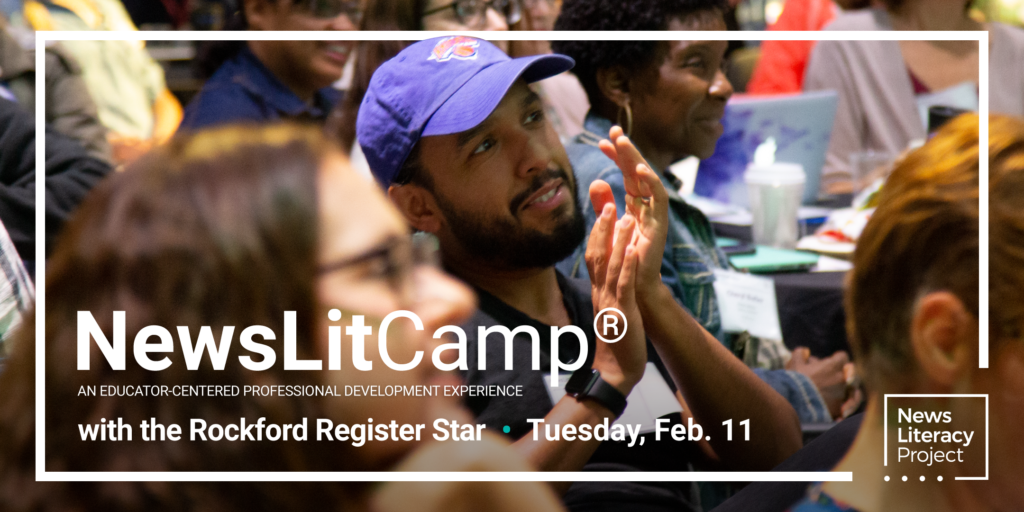

Details
Educators will meet at the Rockford Register Star, 99 E. State St., on Tuesday, Feb. 11, for a full day of free workshops and interactions with their journalists and experts from the News Literacy Project.
Breakfast and networking begin at 8 a.m.; NewsLitCamp starts promptly at 8:30 a.m. Lunch will be provided.
Why attend?
As an educator, you directly influence how your students process everything they read, watch and hear. You’ll leave NewsLitCamp with new ideas, skills and resources to help your students navigate today’s complex and challenging information landscape. Our goal is to develop teachers’ and librarians’ expertise in news literacy education, share specialized teaching resources and provide a behind-the-scenes view of the newsgathering process — demystifying what distinguishes quality journalism from rumors, hoaxes and other types of misinformation.
RPS educators following the required registration protocol will receive 6 PDCs for successful completion; participants from other schools can apply for credit within their districts.
Who can attend
NewsLitCamps are designed primarily for middle school and high school teachers and media specialists. Space permitting, we welcome other educators and school administrators.
Bonus: You’ll learn about our Checkology® virtual classroom, a cutting-edge comprehensive e-learning platform that complements educators’ lesson plans. The topics it examines include:
- Misinformation.
- The practice of quality journalism.
- The First Amendment.
- Watchdog journalism and its contributions to democracy.
- Press freedoms around the world.
About the Rockford Register Star
The Rockford Register Star has been northern Illinois’ leading source of news and information for more than 160 years. Owned by Gannett, it was created in 1979 by the merger of the Register Republic founded in 1855, and the Morning Star, founded in 1888.
This NewsLitCamp is presented by the News Literacy Project and is supported by the Robert R. McCormick Foundation.
Photo Caption: Educators at our NewsLitCamp at NPR in Washington, August 2019. Photo Credit: Andrea Lin / The News Literacy Project.
Akron educators: NewsLitCamp® with the Akron Beacon Journal & Greater Akron Chamber
Join the News Literacy Project, the Akron Beacon Journal and the Six District Educational Compact on Thursday, Jan. 30, for a highly engaging, teacher-centered NewsLitCamp featuring breakout sessions with local journalists.
Register today at this link (it’s FREE!) to reserve your seat: http://bit.ly/newslitcampAkron.
Space is limited. Sign up today to reserve your seat!
NewsLitCamp is a day-long professional development experience based on an “edcamp” style of continuing education. It features topical sessions (selected with input from participants) and educator-driven planning time to empower you to teach news literacy. This format gives education professionals an opportunity to come together for a day of conversations with journalists and news literacy experts.
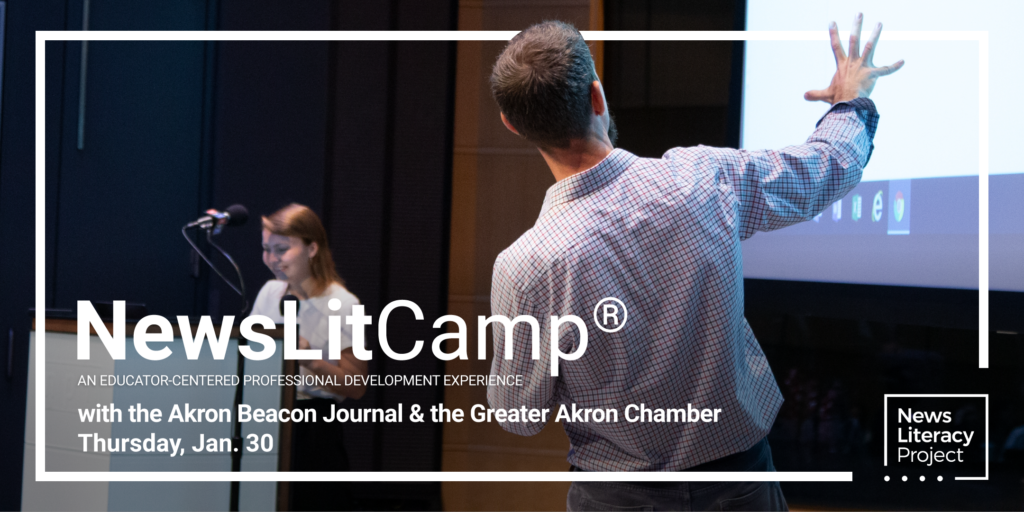

Details
Educators will meet at the Greater Akron Chamber, 388 S. Main St., on Thursday, Jan. 30, for a full day of free workshops and interactions with experts from the News Literacy Project and journalists from the Akron Beacon Journal (which is located in the same building).
Registration and networking will begin at 9:30 a.m.; NewsLitCamp starts promptly at 10 a.m. Lunch will be provided.
Why attend?
As an educator, you directly influence how your students process everything they read, watch and hear. You’ll leave NewsLitCamp with new ideas, skills and resources to help your students navigate today’s complex and challenging information landscape. Our goal is to develop teachers’ and librarians’ expertise in news literacy education, share specialized teaching resources and provide a behind-the-scenes view of the newsgathering process — demystifying what distinguishes quality journalism from rumors, hoaxes and other types of misinformation.
Check out our NewsLitCamp video for a quick look at what the day can offer you and your students.
Participating educators will receive a certificate of completion and may apply for professional development credit within their districts.
Who can attend
NewsLitCamps are designed primarily for middle school and high school teachers and media specialists. Space permitting, we welcome other educators and school administrators.
Bonus: You’ll learn about our Checkology® virtual classroom, a cutting-edge comprehensive e-learning platform that complements educators’ lesson plans. The topics it examines include:
- Misinformation.
- The practice of quality journalism.
- The First Amendment.
- Watchdog journalism and its contributions to democracy.
- Press freedoms around the world.
About the Akron Beacon Journal
A trusted news source since 1839, the Akron Beacon Journal is the largest news-gathering operation in Summit County and is known for its in-depth local reporting. The newspaper and website (BeaconJournal.com) regularly attract accolades from professional journalism associations at the local, regional, state and national levels. The Beacon Journal has received four Pulitzer Prizes, the highest honor in journalism.
This NewsLitCamp is presented by the News Literacy Project and is supported by the John S. and James L. Knight Foundation
Photo Caption: Senior editor of education Cory Turner and production assistant Clare Lombardo leading a session with educators at our NewsLitCamp at NPR in Washington, August 2019. Photo Credit: Andrea Lin / The News Literacy Project.
NYC Educators: NewsLitCamp® with Bloomberg News
Join the News Literacy Project for a NewsLitCamp® in New York City!
Join the News Literacy Project, the New York City Department of Education and Bloomberg News on Monday, Jan. 27, for a highly engaging, teacher-centered NewsLitCamp featuring breakout sessions with experienced journalists. This program is one in a national series of NewsLitCamps led by the News Literacy Project in collaboration with a diverse group of news organizations around the country.
Register today at this link (it’s FREE!) to reserve your seat: http://bit.ly/NYCnewslitcamp.
NewsLitCamp is a day-long professional development experience based on an “edcamp” style of continuing education. It features topical sessions (selected with input from participants) and educator-driven planning time to empower you to teach news literacy. This format gives education professionals an opportunity to come together for a day of conversations with journalists and news literacy experts.
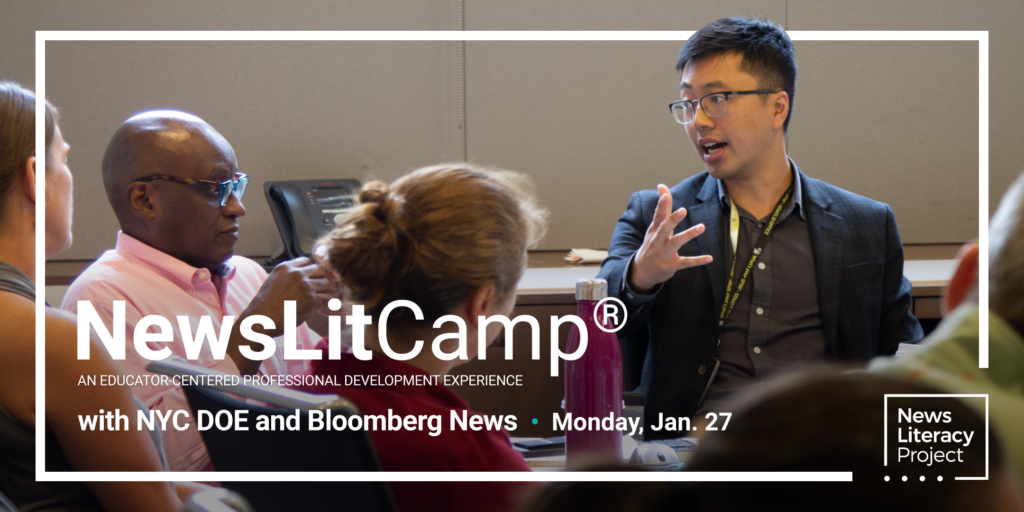

Details
Educators will meet at Bloomberg, 731 Lexington Ave., on Monday, Jan. 27, for a full day of free workshops and interactions with experts from the News Literacy Project and journalists from Bloomberg News.
Breakfast and networking begin at 8 a.m.; NewsLitCamp starts promptly at 8:30 a.m. Lunch will be provided.
Why attend?
As an educator, you directly influence how your students process everything they read, watch and hear. You’ll leave NewsLitCamp with new ideas, skills and resources to help your students navigate today’s complex information landscape. Our goal is to develop teachers’ and librarians’ expertise in news literacy education, share specialized teaching resources and provide a behind-the-scenes view of the news-gathering process. These sessions aim to demystify and explain what distinguishes quality journalism. Check out our NewsLitCamp video for a quick look at what the day can offer you and your students.
NYCDOE participants can receive up to seven hours of CTLE credit (you must sign up with your DOE email: schools.nyc.gov). Participants from other schools can apply for credit within their districts.
Who can attend
NewsLitCamps are designed primarily for middle school and high school teachers and media specialists. Space permitting, we welcome other educators and school administrators.
Bonus: You’ll learn about our Checkology® virtual classroom, a cutting-edge comprehensive e-learning platform that complements educators’ lesson plans. The topics it examines include:
- Misinformation.
- Bias.
- The standards of quality journalism.
- The First Amendment.
- Watchdog journalism and its contributions to democracy.
- Press freedoms around the world.
About Bloomberg News
Bloomberg News, a division of Bloomberg LP, is an international news agency headquartered in New York. Its reporting is disseminated through the Bloomberg Terminal, Bloomberg Television, Bloomberg Radio, Bloomberg Businessweek, Bloomberg Markets, Bloomberg.com and Bloomberg’s mobile platforms. Using the power of technology, Bloomberg connects the world’s decision-makers to accurate information on the financial markets — and helps them make faster, smarter decisions.
This NewsLitCamp is presented by the News Literacy Project in partnership with Bloomberg News.
Photo Caption: Reporter Tim Mak and deputy managing editor Terence Samuel leading a session with educators at our NewsLitCamp at NPR in Washington, August 2019. Photo Credit: Andrea Lin / The News Literacy Project.
Columbia educators: NewsLitCamp® with South Carolina Educational Television and Public Radio
Join the News Literacy Project (NLP), South Carolina ETV and Public Radio, and Richland School District Two for a highly engaging (and free!) one-day NewsLitCamp, featuring breakout sessions with journalists. RSD2 educators can receive up to 7 renewal credits; other educators can apply for credit from their districts.
Register today at this link (it’s FREE!) to reserve your seat: http://bit.ly/ColumbiaNLC. Space is limited.
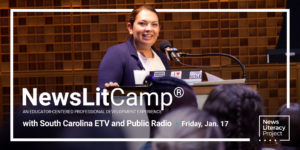

Details
Educators will meet at the Richland Two Institute of Innovation (R2I2), 763 Fashion Drive, on Friday, Jan. 17, for a full day of free workshops and interactions with experts from the News Literacy Project and journalists from South Carolina ETV and Public Radio.
Breakfast and networking begin at 8 a.m.; NewsLitCamp starts promptly at 8:30 a.m. Lunch will be provided.
Why attend?
As an educator, you directly influence how your students process what they’re reading, watching and hearing. You’ll leave NewsLitCamp with new ideas, skills and resources to help your students navigate today’s complex and challenging information landscape. Our goal is to develop teachers’ and librarians’ expertise in news literacy education, share specialized teaching resources and provide a behind-the-scenes look at the newsgathering process. These sessions (selected with input from participants) aim to demystify that process and explain what goes into the creation and production of quality standards-based journalism. Check out our NewsLitCamp video for a quick look at what the day can offer you and your students.
Richland Two educators can receive up to 7 renewal credits for participation; educators from outside RSD2 can apply to their districts for credit.
Who can attend
NewsLitCamps are designed primarily for middle school and high school teachers and media specialists. Space permitting, we welcome other educators and school administrators.
Bonus: You’ll learn about our Checkology® virtual classroom, a cutting-edge comprehensive e-learning platform that complements educators’ lesson plans. The topics it examines include:
- Misinformation.
- Bias.
- The practice of quality journalism.
- The First Amendment.
- Watchdog journalism and its contributions to democracy.
- Press freedoms around the world.
About South Carolina ETV and Public Radio
As the state’s public educational broadcasting network, South Carolina ETV and Public Radio uses television, radio and the internet to enrich lives by educating children, informing and connecting citizens, celebrating our culture and environment, and instilling the joy of learning. It provides national and local content to classrooms via internet services Knowitall.org, LearningWhy and PBS Learning Media, along withteacher training and recertification in face-to-face and online settings. SCETV and Public Radio began in 1958 with closed-circuit broadcasts to multiple schools of French and plane geometry classes at Dreher High School in Columbia. Today the network comprises 11 TV stations, eight radio stations and a statewide tower network that serves schools, hospitals and emergency management teams.
This NewsLitCamp is presented by the News Literacy Project and is supported by the John S. and James L. Knight Foundation
Photo Caption: Welcoming remarks by K. Hirsch, social studies supervisor, Arlington Public Schools, at our NewsLitCamp at NPR in Washington, August 2018. Photo Credit: Andrea Lin / The News Literacy Project
A look inside NLP’s NewsLitCamp® at the San Francisco Chronicle
EdSurge, an online news outlet that focuses on education technology, reported on NLP’s Nov. 14 NewsLitCamp at the San Francisco Chronicle. “Inside a News Literacy Camp, Where the Newsroom Becomes the Classroom” notes that the unique professional development format and setting of a NewsLitCamp allows the educators and journalists in attendance to learn from each other.
